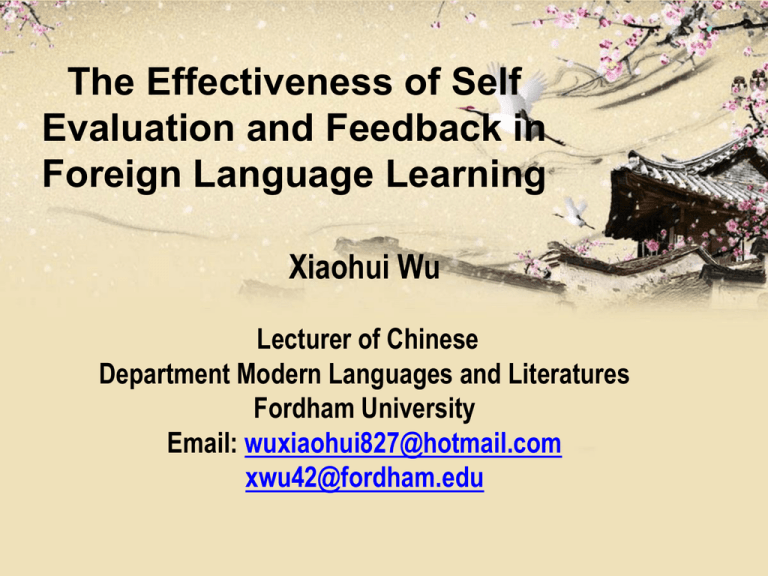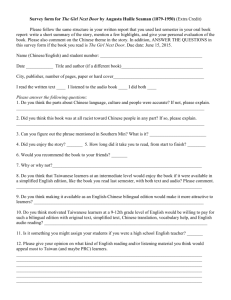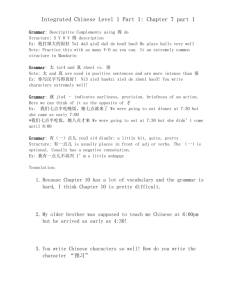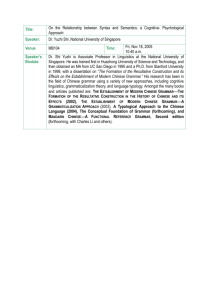PowerPoint Presentation - CLTA-GNY
advertisement

The Effectiveness of Self Evaluation and Feedback in Foreign Language Learning Xiaohui Wu Lecturer of Chinese Department Modern Languages and Literatures Fordham University Email: wuxiaohui827@hotmail.com xwu42@fordham.edu Purpose of the study • explore the effectiveness of the practice of regular self-evaluation in Chinese as foreign language learners’ (CFL) overall language proficiency • investigate CFLs’ opinion and reaction to the practice of self-evaluation Research Methodology • Survey : 14 students in level 1; 25 in level 2; 16 in level 3 • Interview : Theoretical framework • Saito (2003) argued that interest has expanded in the use of self-evaluation in second language learning due to the current trends in learner-centered language teaching approach, and a growing interest in instructiveness. Theoretical framework • Nunan (1988) started that learners got to know “how to learn” through regular and consistent self and peer evaluation. Through regular and consistent self evaluation of their language proficiency, learners become aware of what their strengths and weaknesses are in the target language. Theoretical framework • After self-reflecting their learning, they are more aware of what they need to work on to improve, learners will then be able to ask assistance from their teachers and peers in the areas they need support and improvement (Benson, 2001). Self Evaluation Survey Use both blackboard and paper format Result Self Evaluation Survey Conducted monthly (four rounds) : • 1st round: needs analysis 1. Why would you like to learn Chinese? 2. What’s your weakness in Chinese? 3. What do you expect to learn from this course? Self Evaluation Survey Conducted monthly (four rounds) : •2nd round: progress 1. Talk about some important things you have learned so far in this course? 2. Talk about your weakest points in Chinese and what you will do to improve 3. Talk about Wu Laoshi's strong and weak points in teaching. What Wu Laoshi should change or adjust to better assist you in learning and making progress. (You can be honest as I cannot see your name :-) Self Evaluation Survey Conducted monthly (four rounds) : •3rd round: progress 1. Reflect upon the weaknesses you mentioned in the previous self-evaluation? Have you taken any action/efforts to improve those weaknesses? Did you make any progress? If not, how would you do better to make progress? 2. Talk about what Wu Laoshi can change or adjust to better assist you. Self Evaluation Survey Conducted monthly (four rounds) : •4rd round: progress 1. Reflect upon the weaknesses you mentioned in the previous self-evaluation? Have you taken any action/efforts to improve those weaknesses? Did you make any progress? If not, how would you do better to make progress? 2. Talk about what Wu Laoshi can change or adjust to better assist you. Result For Students: • self-evaluations have effectively in improved students’ overall language proficiency; • Self-evaluations are most effective in improving learners’ writing and reading; • Students responded that self-evaluations have positive effects on their learning in general. Result For instructor: • self-evaluation and feedback has helped the instruction consistently monitor students’ progress; • It has also helped the instructor see how I can better assist students learn Chinese more effectively based on their feedback; • Ultimately these regular evaluation can help the instructor get excellent end-of-semester evaluation. Quotes from students’ responses • So far, in this course, the most important thing I've learned is grammar. I think without grammar, a language cannot be fully learned; • This far, I've learned a lot in this course. I think the most important thing that I've learned are new words, especially sentence connectors so I can create better paragraphs when writing; • I have learned much more about Chinese culture this semester, and I feel that my grammar, reading, and writing abilities are slowly, but noticeably, progressing. • I definitely think my writing has improved so far in this course. I feel like I can write more eloquently in Mandarin now. Quotes from students’ responses • I am terrible at memorizing the characters, but I will try to write them over and over until I remember to my best ability ; • Reading and writing. I will try to study vocabulary more in advance and prepare before we learn a new lesson in class ; • I have difficulty writing Chinese. Some of those characters I just forgot, I hate that. • My weakest part is reading, there are many characters that I have forgotten or don't recognize. The dictation and reading is deifnitely helping me learn alot of new words; Quotes from students’ responses • Wu Laoshi is very capable at many aspects of teaching, and dedicated to our success as students. I am very grateful to have you as my teacher. You are always open to change and selfcriticism. I feel that more time ought to be devoted to grammar practice, rather than vocab, at the beginning of each of lesson. Going over the vocab at the beginning of class doesn't really help-it takes much more time to learn. Explaining the grammar is more useful. Also, I feel that the workload adjustments are good. • Some parts of the lesson, it is fine to go quickly. I love Wu Lao Shi's charisma and energy in the classroom, she encourages me to continue learning. However, there are some part that need more time in the classroom, like new vocab words and sentence structures. Instead of going through the list of chinese words on the powerpoint, it would be helpful to learn the new vocab in a sentence or learning a character's meaning in the word. Reference • Benson, P. (2001). Teaching and Researching Autonomy in Language Learning. London: Longman • Nunan, D. (1988).The Learner-centered Curriculum: A Study in Second Language Teaching. Cambridge: Cambridge University Press • Saito, Y. (2003). The use of self-assessment in second language assessment. Working paper in TESOL and Applied Linguistics




